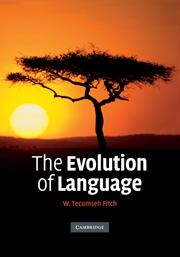Book contents
- Frontmatter
- Contents
- List of figures
- Acknowledgments
- Introduction
- SECTION 1 THE LAY OF THE LAND
- SECTION 2 MEET THE ANCESTORS
- SECTION 3 THE EVOLUTION OF SPEECH
- SECTION 4 EVALUATING PHYLOGENETIC MODELS OF LANGUAGE EVOLUTION
- 11 Historical overview: Western theories of language origin before Darwin
- 12 Lexical protolanguage
- 13 Signs before speech: gestural protolanguage theories
- 14 Musical protolanguage
- 15 Conclusions and prospects
- Glossary
- Appendix: species names
- References
- Author index
- Subject index
- Species index
12 - Lexical protolanguage
Published online by Cambridge University Press: 05 June 2012
- Frontmatter
- Contents
- List of figures
- Acknowledgments
- Introduction
- SECTION 1 THE LAY OF THE LAND
- SECTION 2 MEET THE ANCESTORS
- SECTION 3 THE EVOLUTION OF SPEECH
- SECTION 4 EVALUATING PHYLOGENETIC MODELS OF LANGUAGE EVOLUTION
- 11 Historical overview: Western theories of language origin before Darwin
- 12 Lexical protolanguage
- 13 Signs before speech: gestural protolanguage theories
- 14 Musical protolanguage
- 15 Conclusions and prospects
- Glossary
- Appendix: species names
- References
- Author index
- Subject index
- Species index
Summary
Introduction
This chapter will discuss what is, to many, the most intuitive class of models for the evolution of language. Such models posit a “lexical” protolanguage, with a large learned lexicon of meaningful words, but no complex syntax. Words in a lexical protolanguage are not combined into complex syntactic structures, leaving modern syntax as the final step in language evolution. This “syntax-final” model of language evolution is shared by a diverse group of scholars who disagree about almost everything else (e.g. Lieberman, 1984; Bickerton, 1990; Givón, 1995; Jackendoff, 2002). A lexical protolanguage assumes, as prerequisites, an ability for vocal imitation (necessary to develop a shared spoken vocabulary) and a capacity and drive for referential communication. Although the idea of a lexical protolanguage is implicit in a number of distinct hypotheses about language evolution, it has been defended most explicitly by Derek Bickerton, especially in his book Language and Species (Bickerton, 1990). Bickerton's notion of protolanguage has since been adopted by various other theorists (Jackendoff, 1999, 2002) and criticized by others (Deacon, 1997; Lieberman, 2000). Bickerton's treatment draws on a wide range of data, and is relatively explicit, giving reasons (both data and argument) for most of his assumptions. He explicitly aims to build bridges between linguistics and evolutionary theory, taking both Chomsky and Darwin seriously, and thus provides a reasonable starting point for discussions of contemporary theories of language evolution. Bickerton's model of lexical protolanguage solves a number of problems quite neatly, while leaving several important evolutionary problems open.
- Type
- Chapter
- Information
- The Evolution of Language , pp. 401 - 432Publisher: Cambridge University PressPrint publication year: 2010

